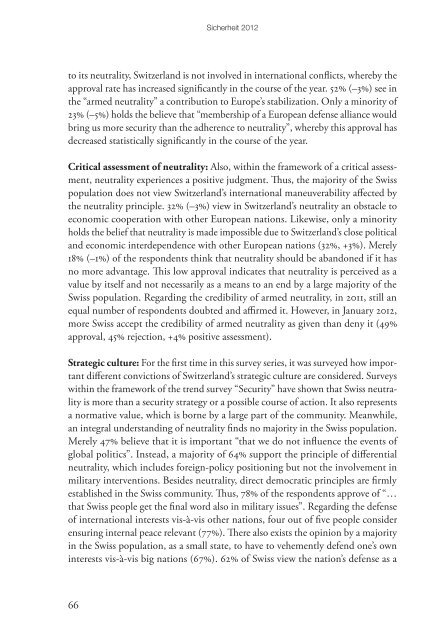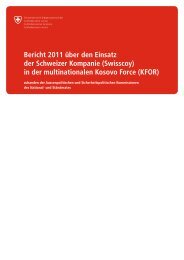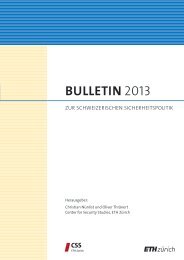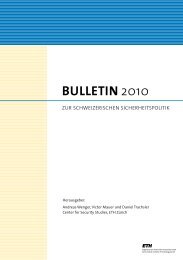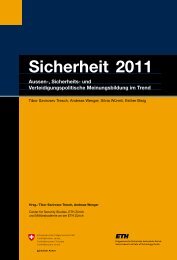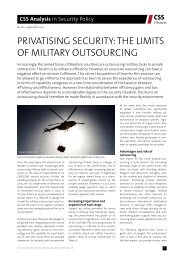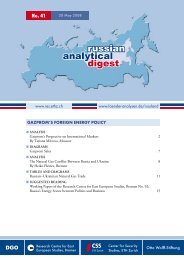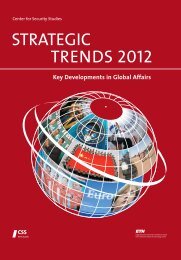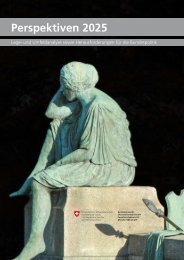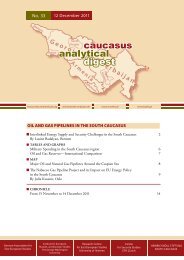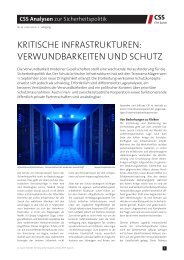Sicherheit 2012 - Center for Security Studies (CSS) - ETH Zürich
Sicherheit 2012 - Center for Security Studies (CSS) - ETH Zürich
Sicherheit 2012 - Center for Security Studies (CSS) - ETH Zürich
Sie wollen auch ein ePaper? Erhöhen Sie die Reichweite Ihrer Titel.
YUMPU macht aus Druck-PDFs automatisch weboptimierte ePaper, die Google liebt.
<strong>Sicherheit</strong> <strong>2012</strong><br />
to its neutrality, Switzerland is not involved in international conflicts, whereby the<br />
approval rate has increased significantly in the course of the year. 52% (–3%) see in<br />
the “armed neutrality” a contribution to Europe’s stabilization. Only a minority of<br />
23% (–5%) holds the believe that “membership of a European defense alliance would<br />
bring us more security than the adherence to neutrality”, whereby this approval has<br />
decreased statistically significantly in the course of the year.<br />
Critical assessment of neutrality: Also, within the framework of a critical assessment,<br />
neutrality experiences a positive judgment. Thus, the majority of the Swiss<br />
population does not view Switzerland’s international maneuverability affected by<br />
the neutrality principle. 32% (–3%) view in Switzerland’s neutrality an obstacle to<br />
economic cooperation with other European nations. Likewise, only a minority<br />
holds the belief that neutrality is made impossible due to Switzerland’s close political<br />
and economic interdependence with other European nations (32%, +3%). Merely<br />
18% (–1%) of the respondents think that neutrality should be abandoned if it has<br />
no more advantage. This low approval indicates that neutrality is perceived as a<br />
value by itself and not necessarily as a means to an end by a large majority of the<br />
Swiss population. Regarding the credibility of armed neutrality, in 2011, still an<br />
equal number of respondents doubted and affirmed it. However, in January <strong>2012</strong>,<br />
more Swiss accept the credibility of armed neutrality as given than deny it (49%<br />
approval, 45% rejection, +4% positive assessment).<br />
Strategic culture: For the first time in this survey series, it was surveyed how important<br />
different convictions of Switzerland’s strategic culture are considered. Surveys<br />
within the framework of the trend survey “<strong>Security</strong>” have shown that Swiss neutrality<br />
is more than a security strategy or a possible course of action. It also represents<br />
a normative value, which is borne by a large part of the community. Meanwhile,<br />
an integral understanding of neutrality finds no majority in the Swiss population.<br />
Merely 47% believe that it is important “that we do not influence the events of<br />
global politics”. Instead, a majority of 64% support the principle of differential<br />
neutrality, which includes <strong>for</strong>eign-policy positioning but not the involvement in<br />
military interventions. Besides neutrality, direct democratic principles are firmly<br />
established in the Swiss community. Thus, 78% of the respondents approve of “…<br />
that Swiss people get the final word also in military issues”. Regarding the defense<br />
of international interests vis-à-vis other nations, four out of five people consider<br />
ensuring internal peace relevant (77%). There also exists the opinion by a majority<br />
in the Swiss population, as a small state, to have to vehemently defend one’s own<br />
interests vis-à-vis big nations (67%). 62% of Swiss view the nation’s defense as a<br />
66


